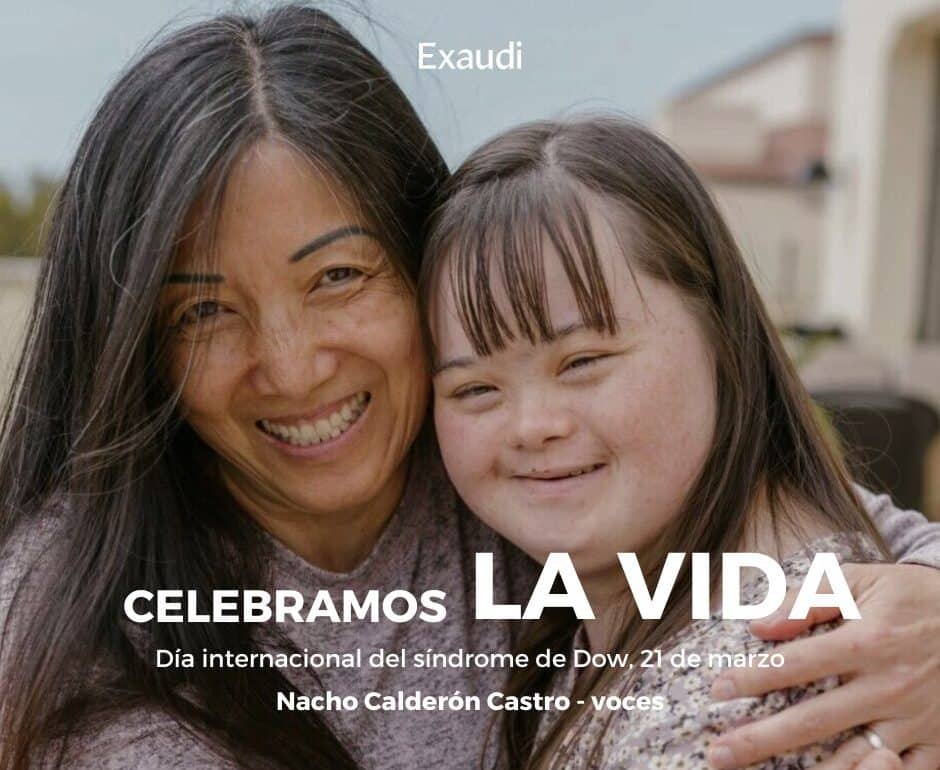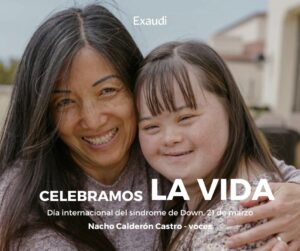On March 21 we celebrate International Down Syndrome Day. The date is, although they may not know it, a tribute to Dr. Jerome Lejeune, discoverer of the third chromosome (hence the choice of the third month of the year) in which there should be a single chromosome pair, the 21st. Hence, the celebration is on March 21st.
Logically, it is a day to celebrate. Celebrate what? Life. Life’s essence.
As Mr. José Antonio Munilla likes to explain, René Descartes was wrong. His famous axiom “I think therefore I am” is not true. The truth is that “I am loved, therefore I am.”
People with trisomy 21 show us better than any other group in the world that they exist because they are loved – like any other person.
When you see a person under the age of 10 or 15, or even a little older, with Down syndrome, know that their genetic condition was most likely diagnosed before their birth and their parents were given the option to terminate (not terminate). ) pregnancy under the pressure (not voluntarily) of “how difficult their life was going to be” (that of the child and that of the parents). I mean, they were given the option to end their son’s life. In a word: abort.
If that child is in the world today it is for the simple reason that his parents said NO! to ending the life of his child, NO TO ABORTION! Why? “Because we love him.” We love him, therefore he exists.
86 percent of pregnancies in which there is a possibility that the baby has a chromosomal condition – and the most common is trisomy 21 – end in induced abortion, it seems that few are loved.
Recently, I was listening to a doctor tell a discouraging story. In their hospital, a girl was born with trisomy 21. When the parents received the news, they put the girl up for immediate adoption and asked the medical staff to inform her relatives that the girl was stillborn, as they wanted to make sure that no one in the family would be tempted to adopt her. They asked to be transferred from the ward to a different one from the maternity ward so as not to be close to “the girl”.
The girl was admitted there, despite not having any pathology that required her to remain in the hospital, and two nurses immediately began the procedures to try to achieve the adoption. The hospital was forced to buy a closet in order to store the enormous amount of gifts that the hospital staff were bringing him. This girl will grow – exist – thanks to love. She is loved so she will exist for many years, God willing.
On March 21 we celebrate Life.
But International Down Syndrome Day is also a day to claim. We cannot remain complacent about “how good down syndrome is today! How things have changed!”
I’ll be direct: people with Down syndrome ARE NOT as well as they can be and therefore SHOULD be.
If in the last fifty years the lives of people with trisomy 21 have changed radically, making very small changes in the dynamics, in care and in their teaching, imagine how they will be when society assumes the profound changes that it must do to welcome them, support them in their development and help them reach their potential!!
What needs to change? I am going to limit myself to a single area: therapeutic care. (I would also like to write about the teaching of people with Down syndrome, but they tell me that no one reads more than 1,000 words anymore, and I fear that this time I am going to go too far).
Therapeutic care continues to be VERY POOR. Most professionals continue to think that two weekly sessions are enough (be it a neurological organization program, speech therapy, occupational therapy, physiotherapy, sensory therapy, early care, academic support – which more than support It is academic development because what they do in schools and nowhere is extremely close).
Every time I raise the NEED for at least 5 days and ideally 6 days of therapy, the terrified professionals raise their hands and raise their voices. And the boy!! When does he play?!! (I advise using a dramatic voice, as if you were watching a horror movie)
Well that’s what I’m asking! When do children play? Those with Down syndrome and those without. Because what I see is that children hardly play and if they have a free minute after school, their homework and extracurricular activities are in front of a screen.
And how much of the time they spend at school is spent? I am not saying for the children, but for the teachers, who do not know what to do with children with difficulties because they have not received even the slightest notion of what intellectual disability is and how to REDUCE IT.
Couldn’t we get children with intellectual disabilities to spend two hours less at school and dedicate it to what will really help them in their lives in the future, which is: speaking better, writing better, reasoning better, being more skilled? with their hands, be more skillful with their feet and have more control over their impulses – which is the objective of therapies (done well) and that schools do not have the slightest idea of how to do it?
I am convinced that THERE IS NO greater act of respect towards a person with Down syndrome than doing therapy.
Doing therapy is saying implicitly, but loudly: I believe in you! I know that your potential as a human being is much greater, much greater than what you are able to demonstrate today, and I am going to do everything possible to accompany you and help you. reach your potential. And even if we don’t achieve it, we will never stop trying, and I promise you that I will neither throw in the towel nor settle for less.
I have come to the conclusion, after hearing it dozens of times, that every time a professional says that “two sessions a week are enough” it is because IN THEIR EXPERIENCE, there is no point in doing more therapy. I’m sorry.
My experience tells me the opposite. I have seen very significant differences (vitally significant, not statistically) between doing two and doing five or six days of therapy.
I think the root of the difference between the two perspectives is expectations.
I learned that the higher the expectations, the greater the results can be.
But what they teach in university faculties is that “the parents of children with Down syndrome must lower their expectations, because they tend to be dreamers and the only thing that causes that is frustration in the parents and children.”
Well, let’s accept that thesis. What is the alternative? Let’s keep expectations low, easy to meet, (some say “realistic expectations”, as they say: easy to meet) everyone happy?
I certainly don’t. And I think that if people with Down syndrome knew what they could have become if more had been fought and demanded (yes, demanded, we must demand!) more of them (with them and for them), I think they would not be happy either. .
Would you agree to have low, “realistic” expectations, ultimately easy to meet, with your children/students without disabilities? So why accept them for people with trisomy 21? It is clearly a form of discrimination.
Would we have gotten this far if in the last 50 years there had been a conformity with what was being done, just to “avoid (possible) frustrations”?
I can’t think of a better way to describe mediocrity than accepting low expectations (and the current situation of people with trisomy 21 is VERY LOW compared to what they can be) in order to avoid possible frustrations.
And now, to finish being politically incorrect, I will say that if I had to make a list of the best therapists I have met throughout my thirty-one years dedicated to people with disabilities, there is no doubt in my mind that, At least, the top 10 positions would be occupied by MOTHERS who have done therapy with their children.
This is where the majority of professionals no longer put their hands on their heads, but directly tear their clothes, like Caiaphas: “What need do we have for witnesses anymore? You have just heard the blasphemy” (Mt. 26, 65b).
“Mothers should be mothers, not therapists!!” Well they say. And there are certainly many mothers (and undoubtedly many more fathers) who do not have the necessary or sufficient skills to do therapy with their children and should not do so. And that doesn’t detract from them at all. But I know DOZENS of mothers who have been able to learn everything necessary about how to do good therapy and have executed it MUCH better than the most qualified, dedicated and seasoned professional.
And no, they have not needed psychological therapy to “overcome the frustration of having to act as if they were therapists, and not enjoy their children as mothers” (ask them if they have not enjoyed their children), nor have they been negligent with the rest of the their children, nor with their husbands.
(If someone wants to prove me wrong and decides to do a doctoral thesis on the topic, contact me, I will give you a very extensive study sample).
Let’s celebrate life, on March 21 and every day of the year. Let us demand the end of abortion, eugenics and any other, and let us fight to help people with trisomy 21 reach their full potential, even if that means that they do not spend so many hours in front of a screen, or that they do not have time to color the alphabet complete, the numbers from one to ten and the geometric figures, over and over again, course after course, year after year.











